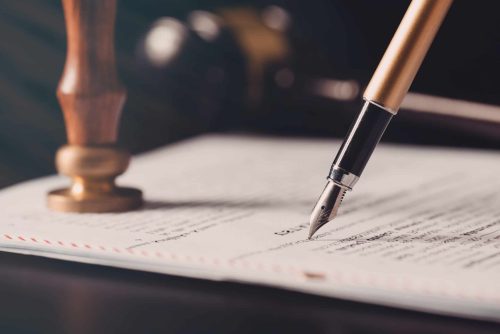Power of Attorney is an instrument in writing whereby one person, known as the principal, appoints another as his agent and confers authority to perform certain specified acts or kinds of act on behalf of a principal. For example, if you are away, unable to transact or sign certain documents , through a power of attorney, you can appoint someone to do it on your behalf.
Estate Planning is about making preparations for uncertainities. A Power of Attorney enables you to make provisions in the event that you become incapacitated or are otherwise unable to perform certain duties/acts. With a Power of Attorney, you can appoint somebody to manage your assets, pay your bills, and make decisions like financial, legal and medical decisions so that your affairs do not grind to a halt just because you are incapacitated.
Other benefits of having a Power of Attorney include: curtailing losses that can arise during incapacitation as assets are managed by an agent, mitigation of conflict between family members or employees and the benefit of having a clear decision making process by the agent in case of incapacitation.
There are 4 different types of Power of attorney, that is, general, Special or limited, durable, and springing Power of attorney.
- Under a general power of attorney, the agent appointed may perform almost any and all acts on behalf of the principal, for example, opening bank accounts and managing personal finances. This Power of Attorney is terminated when the principal dies or when the principal revokes said Power of Attorney.
- On the other hand, a special or limited Power of Attorney is one where an agent is appointed to perform very specific acts limited to a certain area. For example, appointing an agent to sell or buy land on behalf of the principal. This type of Power of Attorney is terminated upon completion of the particular act under the Power of Attorney.
- We also have a durable Power of Attorney. This particular Power of Attorney contains a durable clause that maintains the powers therein even after the principal is incapacitated.
- Last but not least, we have the springing Power of Attorney that only takes effect after a specific event occurs for example, when the principal becomes incapacitated.
The different types of Power of Attorney depend entirely on the intention of the principal. The intention guides the wording of the document. The law governing Powers of Attorney takes cognizance of how this document can expose one to fraud. So, to protect the principal, the law has come up with mechanisms to prevent fraud. These include:
- Doctrine of ratification If the agent performs an act outside the powers conferred upon him/her in the power of attorney, the agent will be deemed to have acted in his or her own capacity and the principal will not be a party to that act.
- The rules of construction of a Power of Attorney The authority conferred by a power of attorney is that which is within the four corners of the instrument either in express terms or by necessary implication. The powers implied will be those incidental powers necessary for carrying out the authority conferred in the Power of Attorney.
- The signatures in a Power of Attorney These are required to be in latin character so as to make clear to everybody receiving that document as to who the signatory is so that it can also be ascertained whether he had the authority or capacity to sign. This applies to both principal and witnesses.
In order for a power of attorney to be effective, it must be registered with the registrar of documents. You can draft several Powers of Attorney for different decisions be it medical, financial, legal and otherwise. A power of attorney needs to be revisited regularly given that circumstances change over time. How can we put solutions like these to work for you? Contact us.













